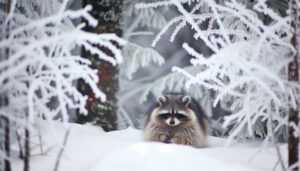How You Can Have a Pet Raccoon in Maine: A Step-by-Step Guide
In Maine, owning a pet raccoon is permissible but subject to strict legal requirements. Prospective owners must obtain a specific permit from the Maine Department of Inland Fisheries and Wildlife.
This permit necessitates a detailed application process, including in-depth care plans and veterinary records, as well as adherence to regular inspections. Legal consequences for non-compliance include fines, wildlife confiscation, and potential criminal charges.
In addition, raccoons pose health and safety risks such as zoonotic diseases. Prospective owners must be committed to meeting the complex needs of raccoons.
For a thorough understanding of these requirements and responsibilities, more information is available.

Key Takeaways
- Owning a pet raccoon in Maine requires a specific permit from the Maine Department of Inland Fisheries and Wildlife (MDIFW).
- The permit process involves a detailed application, care plan, and veterinary records.
- Regular inspections ensure compliance with state wildlife conservation and animal welfare standards.
- Violations of permit regulations can result in fines from $100 to $1,000 and possible criminal charges.
- Raccoons pose health risks, including zoonotic diseases and physical injuries from claws and teeth.
Maine's Exotic Pet Laws
Maine's exotic pet laws are designed to regulate the ownership, care, and welfare of non-domestic animals within the state. These regulations aim to guarantee public safety, animal welfare, and environmental protection.
The Maine Department of Inland Fisheries and Wildlife (MDIFW) oversees these laws, mandating permits for owning certain exotic species. The laws categorize animals based on their potential risk to humans and ecosystems, thereby restricting or prohibiting ownership of species deemed dangerous or invasive.
Specific care standards are stipulated to maintain the health and well-being of exotic pets. Veterinary care requirements, containment protocols, and transportation guidelines are also defined to minimize health risks and ensure humane treatment.
Adherence to these laws is essential for responsible exotic pet ownership in Maine.
Raccoon Ownership Permits
Raccoon ownership in Maine necessitates obtaining a specific permit, which involves a thorough application process. Applicants must adhere to stringent legal requirements, including providing detailed documentation of the raccoon's origin and ensuring appropriate living conditions.
Compliance with these regulations is critical to ensuring both the welfare of the animal and adherence to state wildlife conservation policies.
Permit Application Process
Obtaining a permit for raccoon ownership in Maine involves a detailed application process that requires specific documentation and adherence to state regulations. Applicants must provide proof of adequate housing and care facilities that meet the state's welfare standards for raccoons.
Additionally, veterinary records demonstrating the animal's health status and vaccinations are required. The application also necessitates a detailed care plan, including diet, enrichment, and medical care.
Applicants should be prepared for a thorough background check to guarantee compliance with local wildlife laws. Submission of the completed application, along with any requisite fees, is made to the Maine Department of Inland Fisheries and Wildlife. Approval is contingent upon meeting all outlined criteria, emphasizing responsible and ethical raccoon ownership.
Legal Requirements
To legally own a raccoon in Maine, individuals must comply with a detailed set of legal requirements established by the Maine Department of Inland Fisheries and Wildlife.
Prospective owners are required to obtain a Wildlife Possession Permit, which mandates specific criteria to be met. These criteria include providing adequate housing that mimics the raccoon's natural habitat, securing access to appropriate veterinary care, and demonstrating knowledge of raccoon behavior and dietary needs.
Additionally, the permit application requires submission of a management plan detailing how the raccoon will be cared for, including provisions for containment and enrichment.
Regular inspections by wildlife officials validate adherence to these standards, safeguarding both the animal's welfare and public safety.
Legal Consequences
The legal consequences of keeping a pet raccoon in Maine are governed by strict state wildlife regulations designed to protect both the animals and the public. Violations of these regulations can result in significant fines and legal penalties, including potential confiscation of the animal.
Understanding these legal ramifications is essential for individuals considering raccoon ownership.
State Wildlife Regulations
Maine's wildlife regulations impose strict legal consequences for individuals who possess a pet raccoon without proper authorization. The regulations are designed to protect both native ecosystems and public health. The legal framework requires permits for the possession of wildlife, including raccoons, to guarantee that they are kept in environments that meet specific health and safety standards. Unauthorized possession can lead to wildlife confiscation and other legal actions.
| Regulation Aspect | Description | Legal Requirement |
|---|---|---|
| Permit Requirement | Necessary for wildlife possession | Mandatory |
| Habitat Standards | Specific conditions for captive environments | Strictly Enforced |
| Health Checks | Regular veterinary assessments | Compulsory |
| Public Safety Measures | Measures to prevent zoonotic diseases | Required |
| Enforcement Authority | Maine Department of Inland Fisheries & Wildlife | Regulatory Oversight |
These measures are essential for maintaining ecological balance and public safety.
Potential Fines and Penalties
Individuals found in possession of a pet raccoon without the necessary permits in Maine may face significant fines and legal penalties. Under Maine law, unauthorized possession of wildlife can result in fines ranging from $100 to $1,000 per offense.
Additionally, violators may be subject to criminal charges, which can include misdemeanor or felony classifications depending on the severity and circumstances of the infraction. The court may also mandate community service or educational courses related to wildlife conservation. These measures aim to protect native ecosystems and ensure public safety.
It is imperative for potential pet owners to familiarize themselves with state regulations and obtain required permits to avoid legal repercussions and contribute positively to wildlife stewardship.
Health and Safety Risks
Owning a pet raccoon in Maine presents several health and safety risks that require thorough consideration and awareness. Raccoons are known carriers of zoonotic diseases, including rabies and leptospirosis, which can be transmitted to humans and other pets. Their sharp claws and teeth pose a risk of physical injury, particularly to children and vulnerable individuals.
Additionally, raccoons may harbor parasites such as roundworms, which can cause severe health issues if transmitted. The potential for aggressive behavior, especially during mating season or when feeling threatened, further complicates their domestication. Effective vaccination and regular veterinary care are essential, but not always sufficient, measures to mitigate these risks.
Consequently, the health and safety implications should be critically evaluated before considering raccoons as pets.
Raccoon Behavior
Raccoons exhibit primarily nocturnal activity patterns, which means they are most active during the night and may require a living environment that accommodates this behavior.
Additionally, raccoons are known for their playful and curious nature, often engaging with their surroundings in a manner that can be both entertaining and destructive.
Understanding these behavioral traits is essential for prospective owners to create a suitable and enriched habitat for their pet raccoon in Maine.
Nocturnal Activity Patterns
The nocturnal activity patterns of raccoons demonstrate distinct behaviors influenced by their physiological and environmental needs.
Primarily active during the night, raccoons exhibit foraging behaviors driven by their omnivorous diet, seeking fruits, nuts, insects, and small vertebrates. Their keen sense of touch and dexterous front paws enable them to explore and manipulate objects in low-light conditions. Additionally, raccoons tend to establish and follow habitual routes, contributing to efficient resource utilization.
Environmental factors such as temperature, food availability, and urbanization also profoundly affect their nocturnal activities. Understanding these patterns is pivotal for potential pet owners in Maine, as it highlights the necessity of accommodating a raccoon's natural behavior to guarantee their well-being in a domestic setting.
Playful and Curious Nature
Exhibiting a highly inquisitive and playful demeanor, raccoons engage in a variety of exploratory behaviors that are essential for their cognitive stimulation and physical exercise. Their natural curiosity often leads them to investigate their surroundings meticulously, using their highly dexterous front paws to manipulate objects. These behaviors provide significant insight into their intelligence and adaptability, which are essential for their survival in the wild and in captivity.
| Behavior | Description |
|---|---|
| Object Manipulation | Using paws to open containers and doors |
| Climbing | Scaling trees and structures with agility |
| Foraging | Searching for food in diverse environments |
| Play Fighting | Engaging in social play with other raccoons |
Understanding these behaviors is crucial for those considering raccoons as pets, ensuring their needs for mental and physical engagement are met.
Proper Housing
Ensuring proper housing for a pet raccoon in Maine requires a secure enclosure that accommodates their natural behaviors and provides protection from environmental elements. The enclosure should measure at least 8x8x8 feet, featuring reinforced wire mesh to prevent escapes.
It should encompass various enrichment items, such as climbing structures and hiding spots, to simulate their natural habitat and reduce stress. An indoor area with appropriate bedding material is essential for temperature regulation and comfort.
Additionally, the enclosure must have a shaded section to protect from direct sunlight and a designated area for feeding and hydration. Providing a water feature can also encourage natural foraging behaviors.
Consistent cleaning of the enclosure is vital to maintaining hygiene and preventing disease.
Diet and Nutrition
Providing a balanced diet for a pet raccoon in Maine requires careful consideration of their omnivorous nature and nutritional needs. Raccoons thrive on a varied diet that includes fruits, vegetables, proteins, and grains. Fresh produce such as apples, berries, and leafy greens should be supplemented with sources of protein like lean meats, eggs, and fish.
Additionally, formulated raccoon diets available commercially can ensure a balanced intake of essential nutrients. Avoid feeding raccoons processed human foods, as these can lead to obesity and other health issues. Clean, fresh water must be available at all times to prevent dehydration.
Monitoring portion sizes and feeding frequency is important to maintaining a raccoon's best health and well-being.
Veterinary Care
Regular veterinary care is paramount for the health and longevity of a pet raccoon in Maine, necessitating routine check-ups, vaccinations, and preventive treatments for common ailments. Ensuring thorough veterinary attention involves several critical steps:
- Routine Health Examinations: These are essential for monitoring general health, identifying early signs of illness, and providing ongoing care.
- Vaccinations: Essential vaccines include rabies and distemper, which protect against severe and potentially fatal diseases.
- Parasite Control: Regular treatments for fleas, ticks, and internal parasites are necessary to prevent infestations and related health issues.
- Dental Care: Regular dental check-ups and cleanings help prevent dental diseases, which can affect overall health.
Adhering to these veterinary guidelines will significantly contribute to the well-being of your pet raccoon.
Socialization Needs
Effective socialization is essential for the mental health and behavioral development of a pet raccoon in Maine. Raccoons are inherently social creatures, requiring frequent interaction to prevent behavioral issues such as aggression or anxiety.
Early exposure to diverse environments, people, and other animals can notably mitigate undesirable behaviors. Structured socialization activities should include supervised play, positive reinforcement training, and gradual introduction to new stimuli.
Additionally, maintaining a consistent routine helps raccoons develop predictable patterns, reducing stress. Failure to provide adequate socialization can result in a maladjusted pet, prone to destructive behavior.
Potential raccoon owners must be committed to meeting these social needs to foster a well-adjusted, healthy companion.
Long-Term Commitment
Securing proper socialization is only part of the equation, as owning a pet raccoon in Maine also requires a long-term commitment that encompasses their entire lifespan. Raccoons typically live 10-15 years in captivity, demanding consistent care and attention.
To adequately fulfill this commitment, consider the following:
- Daily Care: Raccoons require daily feeding, enrichment activities, and health monitoring.
- Veterinary Needs: Regular check-ups and vaccinations are vital for maintaining their health.
- Housing Requirements: Secure, spacious enclosures are necessary to provide a safe environment.
- Behavioral Management: Raccoons are intelligent and inquisitive, requiring ongoing training and behavioral guidance.
Addressing these aspects secures a well-rounded, humane approach to raccoon ownership, contributing positively to their well-being.
Alternatives to Pet Raccoons
Considering the complexities and challenges associated with owning a pet raccoon, exploring alternative animals that may offer similar companionship and enrichment is advisable.
Domestic ferrets are a notable option; they are highly social, intelligent, and exhibit playful behavior akin to raccoons. They require less space and are easier to manage.
Another alternative is the sugar glider, a small marsupial that thrives on social interaction and possesses a curious nature.
For those interested in a more traditional pet, adopting a cat or dog provides well-documented health and emotional benefits, and extensive resources are available for their care.
Choosing an animal companion that aligns with one's lifestyle and legal regulations guarantees a sustainable and fulfilling pet ownership experience.
Stories From Owners
Through first-hand accounts, raccoon owners in Maine have shared a wealth of experiences that shed light on the unique challenges and joys of keeping these unconventional pets. Their stories reveal essential insights into the day-to-day realities of raccoon ownership, including behavioral traits, habitat requirements, and social interactions.
Below are key observations from raccoon owners:
- Behavioral Traits: Raccoons exhibit high intelligence and curiosity, often requiring mental stimulation and interactive play.
- Habitat Requirements: Owners emphasize the importance of secure, enriched environments to prevent escape and maintain well-being.
- Dietary Needs: A balanced diet is vital, with specific attention to nutritional needs to avoid obesity and related health issues.
- Social Interactions: Raccoons form strong bonds with their caretakers but may exhibit territorial behavior, necessitating careful management.
These accounts provide valuable information for prospective raccoon owners.
Final Thoughts
In conclusion, the decision to keep a raccoon as a pet in Maine requires a comprehensive understanding of their intricate behavioral, dietary, and habitat needs. Raccoons are intelligent, inquisitive animals that need substantial mental stimulation and physical activity.
Their diet is varied, requiring a well-rounded intake of proteins, fruits, and vegetables. Furthermore, raccoons need a secure, enriched environment to thrive, which can be difficult to maintain in a domestic setting.
Potential pet owners should also be mindful of state regulations and the ethical implications of domestication. Proper veterinary care is essential, given their susceptibility to various diseases. Therefore, while raccoons can be engaging companions, ensuring their well-being demands significant commitment and resources.
Conclusion
To sum up, the ownership of pet raccoons in Maine is governed by strict regulations, reflecting important legal, health, and ethical considerations.
Remarkably, raccoons are known carriers of rabies, with the CDC reporting over 1,500 cases annually in the United States. This statistic highlights the significance of following state laws and understanding the long-term responsibilities involved.
Potential pet owners should consider alternative animals that align more closely with domestic pet norms to guarantee safety and legal compliance.






